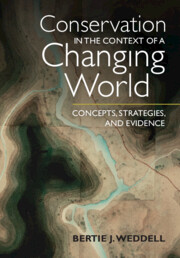
-
Select format
-
- Publisher:
- Cambridge University Press
- Publication date:
- September 2023
- October 2023
- ISBN:
- 9781108985987
- 9781108986502
- Dimensions:
- Weight & Pages:
- Dimensions:
- (244 x 170 mm)
- Weight & Pages:
- 0.7kg, 406 Pages
You may already have access via personal or institutional login
Book description
Recent developments in ecological theory point the way to a stewardship approach that promotes biocultural diversity and ecosystem resilience. In addition, the escalating pace of anthropogenic environmental change makes it clear that conservation strategies which incorporate social as well as ecological dimensions are essential. This thoroughly updated version of Conservation in the Context of a Changing World covers a broader geographic, historical, and cultural scope that integrates material from the natural sciences, social sciences, and humanities. Contemporary and comprehensive, this book provides essential material for understanding trade-offs between different options for resolving complex issues, including climate policy, the contrasting interests of different groups, the changing roles of Indigenous peoples, biopiracy, human-wildlife conflict, and new governance models such as co-management. Sources of evidence about the natural world and the roles of local and traditional people are emphasized. This is a vital resource for making informed decisions about controversial issues in conservation.
Contents
Metrics
Altmetric attention score
Full text views
Full text views help Loading metrics...
Loading metrics...
* Views captured on Cambridge Core between #date#. This data will be updated every 24 hours.
Usage data cannot currently be displayed.
Accessibility standard: Unknown
Why this information is here
This section outlines the accessibility features of this content - including support for screen readers, full keyboard navigation and high-contrast display options. This may not be relevant for you.
Accessibility Information
Accessibility compliance for the PDF of this book is currently unknown and may be updated in the future.

